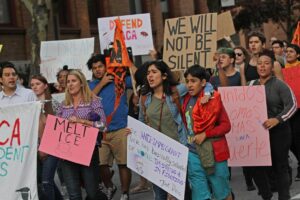by Kerry Torpey on May 3, 2018
Arts & Entertainment

by Sara Conway ’21
A&E Staff
On Tuesday, April 24, Providence College hosted “Immigrant: A Storyteller’s Event” sponsored by the Providence Immigration Rights Coalition. Those in attendance were able to see the written and visual stories of PC students, faculty, and staff members about their personal experiences with immigration and calling the United States home.
While the creators of the showcased pieces remain nameless, the anonymity did not in any way detract from the raw emotion expressed on every canvas, whether a piece of a paper, photo paper, or poster board.
Stepping into Moore Hall 122, one was immediately enveloped by the bright colors of the artwork propped up against the walls on one side of the room. On another, quietly provoking photographs featured in slim, black frames, and the words on white paper, hung up on a line.
Some pieces, particularly the artwork, calls viewers to action, such as the poster headed with #DefendDACA (Deferred Action for Childhood Arrivals), featuring three seated people with interlocking arms and roots growing underneath them and flowers among them. In the corner of the poster reads “Rise Up As One,” asserting the connection between the three figures depicted and their desire to consider the United States their home, as the girl’s T-shirt says, “This is home.”
The Trump administration first announced their plans to end DACA—a program implemented during the administration of former president, Barack Obama, in June of 2012—in 2017, but have stopped accepting new DACA applications, renewals, and the protection of the program as of March 5, 2018.
Obama created DACA according to the recent New York Times article, “U.S. Must Keep DACA and Accept New Applications, Federal Judge Rules” by Miriam Jordan, to argue that children brought into the country when they were young “should be treated as low priorities for deportation.” Those undocumented youth who sign up are known as “The Dreamers,” although in order to stay in the program, an application for the renewal of their status is required every two years.
As seen at PC’s event, the artwork and writing gave visitors a new connection to those struggling as immigrants in the United States. The artists and writers bravely tell their stories, revealing the pain they have sought to overcome, the loss that can never quite be forced back enough into the past and the love that they still feel for the country that raised them, despite the nation’s desire to push them out.
The author of the poem, “The Unwanted, but The Grateful,” pleads with America, writing “You may not want me / But I do want you / You are all I have ever known.” Not all immigrants remember their native countries because they have built part of their lives, or in the case of the author, his entire life, in the United States.
They do not know anything else, yet they still face the discrimination of this supposedly “great” nation whose government—and many citizens—believe that they are not welcome. The writer closes his poem with a plea for compromise: “I can continue to tolerate my not belonging / If you just let me stay.”